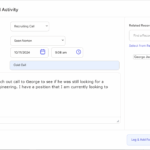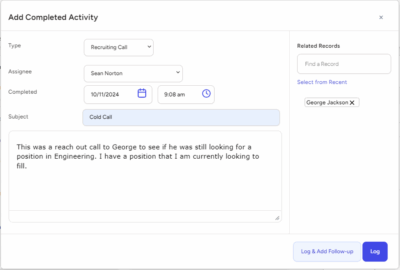A potential client comes to you with an open position they want you to fill. The client likes your services and your experience within the niche. You’re confident you can quickly find several qualified candidates to fill the position.
You and the client begin discussing the contract between you. That’s when the client asks the dreaded question, “What’s your fee?”
You state your fee, and the client begins to talk you down. That’s when the negotiation begins.
If you’re not careful, a client can talk you down to a measly fee for your full range of work. To get a result that’s mutually beneficial, you need to know some negotiation strategies for recruiter fees.
Negotiation strategies for recruiter rates
Use the following tips to improve your negotiation skills for recruiters.
Verify that the client is ready to buy
Before you begin negotiating your recruiter fee, make sure the employer is actually ready to buy your services. Don’t waste your time negotiating if the client only wants your services in the future or if their own efforts fail. Don’t commit to a rate that might be unsuitable in the future.
If a client isn’t ready for your services, suggest that you postpone the money discussion until they are ready to buy. This will ensure they know exactly what they want, and you get a fair rate.
Set a minimum rate
Before you talk to your client about your fee, you need to determine the minimum you’re willing to take. You should know the minimum value of your services and time. Ideally, your minimum amount will still let you turn a small profit.
During the negotiation, you should never go below this minimum amount. If the client wants to go below this amount, it might be best to walk away from this job order.
Ask about the client’s experience
When you’re building a contract with your client, find out if they’ve ever worked with a recruiter before.
If your client has worked with a recruiter before, find out what services the previous recruiter provided. Find out how much the client paid for those services.
Once you know what was provided and paid in the past, you can try to make a deal that’s a little better. For example, if a recruiter charged 25% for similar services, you might offer to charge 22%. Or, you might request the same 25% rate, but offer an extra service.
If a previous recruiter charged a rate that is unreasonably low for you, it’s time to talk up your skills and expertise. Explain why you charge what you do, and why your rate is higher than what the previous recruiter charged.
Talk about your expertise
When you are negotiating your fee, you need to know what you’re worth. You’re not just presenting candidates, you’re providing your expertise.
Talk about your experience. Tell your client how many years you’ve been in business. Talk about your recruiting achievements, including the types of jobs you’ve filled and what companies you’ve worked for. Explain your access to recruiting databases that can help you uncover difficult-to-find candidates. If you worked in the industry before you became a recruiter, mention that. Of course, this strategy works best if you are a seasoned recruiter.
Explain your recruiting process
Clients only see a small portion of what you do. As a result, they might not fully understand what all you do for them. They might think you’re trying to charge them thousands of dollars to pull some names from LinkedIn.
To help clients understand what you do, explain your recruiting process and all the parts that go into it.
If your client still wants to negotiate the fee, you can suggest removing services to bring the price down. Once you start removing services, clients might start to see the value of what you provide.
Determine how much you want the job order
Think about how much you want this job order. Would it be worth taking a lower fee if it guaranteed that you got this contract?
For example, it might be worth lowering your fee if you really need the work. If you are going through a slow period and struggling to manage cash flow, even a little bit of profit can help.
Also, you might consider a lower fee if this job could be a stepping stone to bigger and better job orders. For example, you might accept a lower rate to work with a client that will look good in your recruiting business portfolio. Or, if you’re trying to break into a new niche, you might need to take a lower rate to do so until you gain more experience.









